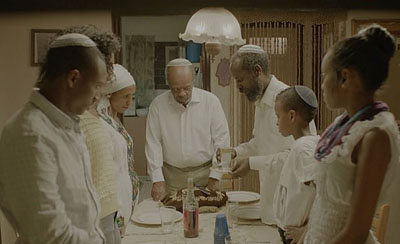 RED LEAVES
RED LEAVES(not rated)
*** (out of 5)
STARRING
Debebe Eshetu as MASGANIO
Hanna Haiela as ZEHAVA
Meir Dassa as BARUCH
Solomon Mersha as MOSHE
Shula Moli as ORLY
Ruti Asarsai as BOSNA
David Getahun as MATAN
Molla Megistu as ACHNEP
Yuval Yaacov as HAI
Adiel Zamro as TAITU
Studio: Daroma Productions
Directed by: Bazi Gete
BY KEVIN CARR
One of the most prevalent issues that I saw tackled in Israeli cinema at the Jerusalem Film Festival was that of the clash between old, traditional values and newer, more modern practices. This isn’t exactly a new concept in itself as art has been dealing with this very thing in many cultures for centuries. This makes it a universal concept, which makes these films relatable to people of many races.
The different angle that is taken in Bazi Gete’s film “Red Leaves” is telling this story through the eyes of an Ethiopian immigrant in Israel. Until I actually traveled there, I was unaware of the large number of Ethiopians who immigrated to this country, and with them – like any group of immigrants – they brought with them old traditions that seem to now be waning in their culture.
“Red Leaves” examines the life of a man Meseganio Tadela (Debebe Eshetu), a 74-year-old recent widower and Ethiopian immigrant. Following the death of his wife, Meseganio sells his apartment and plans on living the rest of his days alternately living with the families of his sons. However, once put into practice, he discovers that his hard-lined traditional values are challenged by family members.
Whether it be a granddaughter who doesn’t respect her parents and wants to be sexually active, or if it’s his daughter-in-law who resents his visits and plays mind games with him while requiring her husband to take her side, Meseganio becomes estranged from one of his sons. The other has his own problems, including a stubborn teenage boy and an extramarital affair.
Soon, Meseganio learns there isn’t a place for him with these families, and so he finds himself a sort of immigrant again, having to pick up the pieces of his life and find his own place in the world once more.
Director Bazi Gete comes from an immigrant family himself, so his overall theme for the film is one of immigration and finding your place. There are few answers given in the film, and similarly few direct questions as well. Instead, we are offered a dense character study of a man whose waning years of his life are not exactly what he hoped they would be.
Like other Israeli films that pit old values against new ones, “Red Leaves” demonstrates how this internal culture class leaves casualties in its wake. However, it doesn’t glorify either set of values as each one has its own foibles. In one, there’s an oppressive nature and inherent sexism, which becomes shockingly apparent when Meseganio threatens to beat his daughter-in-law for being insubordinate to him. Likewise, the looser sexual standards of the newer generation is rife with its own problems, which we see as his granddaughter puts her future at risk and his other son threatens to destroy his own marriage.
Like any culture that faces changing values over generations (which is to say, all of them), “Red Leaves” gives you a chance to examine your own prejudices by stepping outside of your life and into a different one. It is a family drama and a character study at the same time. It has some points that drag and become overindulgent in terms of filming techniques, and the ending becomes too ambiguous to be fully appreciated. However, on the whole, this is an intriguing film that pulls back the veil on a lesser-known element of Israeli culture.
